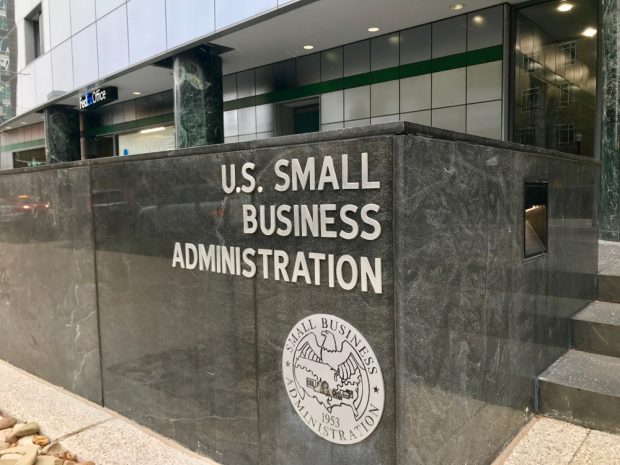 Small Business Administration headquarters building entrance (Image: Shutterstock).
Small Business Administration headquarters building entrance (Image: Shutterstock).
Credit union trade groups said new rules by the U.S. Small Business Administration will increase risks of fraud by under-regulated fintechs.
The SBA announced last week that it is finalizing new rules to take effect May 12. Part of the rules expand the ranks of SBA lenders by increasing the number of Small Business Lending Company (SBLC) licenses.
Recommended For You
For the past 40 years, the number of these SBLC licenses has been capped at 14 lenders, "limiting potential lending options for small businesses," an April 12 SBA news release said.
"Community Advantage lenders have lacked long-term certainty about their participation in SBA programs due to the pilot status of the program," the SBA said. "Even with these limitations, the Community Advantage Pilot Program has demonstrated success with higher rates of lending to Black, Hispanic, women and veteran-owned businesses."
Last December, NAFCU asked the SBA to delay the rule, citing its concerns about under-regulated fintechs. President/CEO Dan Berger said on April 13 the trade group was "disappointed" the SBA ignored its concerns.
 Dan Berger
Dan Berger "Allowing unregulated fintechs to participate in these programs heightens fraud risks — as evidenced by the alarming results of the Paycheck Protection Program," Berger said. "NAFCU firmly believes that credit unions represent the best and safest financial option for Americans, and we will continue to advocate for the SBA to safeguard the integrity of its essential programs from fraud-prone fintechs."
CUNA President/CEO Jim Nussle said regulation of the Small Business Lending Companies would be the responsibility of the SBA's Office of Credit Risk Management (OCRM). He said lenders have reported the OCRM is operating at maximum capacity without additional supervisory responsibilities.
 Jim Nussle
Jim Nussle "This final rule removes long-standing, existing prudent lending standards we believe will unintentionally harm the minority and underserved communities it is trying to help," Nussle said. "New lending entities would not face the same regulation credit unions and other community lenders are subject to, and the removal of these guardrails gives us serious concerns that the changes will not have the positive impact intended."
The SBA cited support for the new rules by the African American Alliance of CDFIs, the National Association of Latino Community Asset Builders, the National Urban League, the Native CDFI Network, Oweesta Corporation and Prosperity Now.
 Isabella Casillas Guzman
Isabella Casillas Guzman U.S. Small Business Administrator Isabella Casillas Guzman cited decades-long challenges for small business owners, particularly those in underserved communities. In 2022, two out of three business owners who sought credit did not receive what they needed. The number of lenders that originated the SBA's 7(a) loans under $50,000 and $150,000 decreased by over 40% and 25%, respectively, for the past five to seven years.
"Modernizing and expanding SBA's lending programs will open new opportunities to our highly entrepreneurial, yet underserved communities that have far too long been denied access to the funding they need to create jobs and grow our economy," Guzman said.
© Touchpoint Markets, All Rights Reserved. Request academic re-use from www.copyright.com. All other uses, submit a request to [email protected]. For more inforrmation visit Asset & Logo Licensing.







